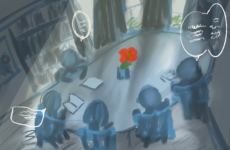An essential part of any Choate boarding student’s life is his or her adviser, who helps with everything — from keeping up with classes to having a fulfilling social life. They also serve as trusted adults on campus to talk to, as many of us boarders live far away from our parents. As I do not have experience with the day student advisory system, I will be focusing on the boarding advisory system in this article.
Every so often, students and their advisers get together to talk about how things are going. And because all student’s advisers live or do duty in their dorms, by the end of the school year, students know their advisers well. However, Choate students get a new adviser each time they move dorms, which often happens every year. Thus, the process of getting to know an adviser must happen over and over again.
Why do we have to get a new adviser almost every year? To me, it doesn’t make sense. Instead of hitting the reset button each year, students should keep the same adviser throughout their entire Choate career.
It is hard for anyone to discuss personal issues with someone they don’t know well. So for many students on campus, it is hard to reach out to an adviser, especially a new one, to chat on a deeper level. The adviser ends up becoming someone to meet with every once and a while to talk about grades, not as someone who students can really trust. Yet the latter should be true for everyone.
Many believe that it is important for advisers to live or to do duty in a student’s dorm as it makes the advisers easily accessible, and so, switching advisers every year is worth it. However, we forget that the original reason advisers currently live in dorms is to encourage interaction with students. But if students had true, strong relationships with their advisers, students would seek them out and interact with them regardless. For instance, I often see and talk to my adviser from last year, who I now know well and who doesn’t live in my dorm.
Naturally, the bond between a student and an adviser strengthens over time. An adviser who really knows a student well could tell if they are, say, depressed or tired, and then take action to help them. A new adviser will find it harder to identify those things and won’t be able to help as much. In the end, it’s better for everyone when students are encouraged to build strong relationships with their advisers over time.
Some argue that switching advisers every year allows students to cultivate strong relationships with more than just one adult on campus. Yet, we forget that students already get to know many adults in the classroom, during sports, or while participating in other commitments. It seems more logical for students to have one adviser they can really trust rather than a few adults scattered around campus whom they can only somewhat trust.
The current advisory system gets a lot of things right. It gives students time to meet with their advisers and encourages interaction. I personally have had a good experience with it. However, I still believe that it is falling short of its potential.
As students graduate, they should be able to look back at their advisers as people whom they knew well. They shouldn’t remember three or four adults whom they never really connected with. Ultimately, a system where students could keep their advisers throughout their Choate careers would benefit both students and advisers far more than the current system does.





